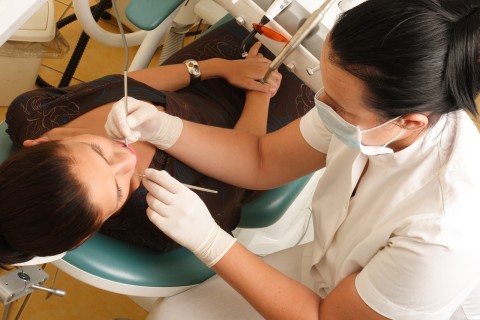A visit to a local dentist in Guelph and elsewhere is pretty straightforward, right? You come in and the dentist thoroughly scans your mouth for cavities so he can treat them. A host of other procedures he can do include teeth cleaning, applying preventive treatments like sealants, and identifying the tell-tale signs of gum disease. Afterwards, you settle the bill and go on your merry way.

What you don’t realize, however, is that a dental visit is way more than that. A clinic director from the University of Minnesota stresses that while a routine dental exam is important for maintaining oral health, it’s also a good opportunity to detect oral cancer as early as possible. Dentists have a critical role to play in the treatment process, since oral cancer’s 5-year survival rate is a bit low (50 per cent), making early detection all the more important, and that dentists are the professionals who work most closely with the mouth.
A comprehensive oral cancer screening performed by a qualified dentist from a local practice in Guelph, such as the Woolwich Dental Group, involves more than merely looking around your mouth. The dentist will try to feel around your face, neck, lips, tongue, thyroid and salivary glands, and lymph nodes for abnormalities. To give way to a thorough inspection, prior dental fixtures, like dentures, must be temporarily removed.
Contrary to popular belief, dentists cannot explicitly diagnose oral cancer per se, but rather identify areas of concern. According to the American Dental Association, oral cancer can only be examined via a biopsy, which takes a tissue sample from a specific area in the oral cavity and puts it under a microscope. The best a dentist can do is employ his own methods, like using a dye called toluidine blue. This dye turns blue if spread over an abnormal area, which then points to a cause for concern. Another method is the use of a laser light which, if bounced off abnormal tissue, changes in appearance.
Once problem areas are duly identified, a dentist may hand out varying recommendations. He may advise that you do a follow-up visit after a few days or weeks, in order to see if the abnormality stays and if it has grown bigger or shrank over time. If the abnormality didn’t budge with the wait, the dentist may now recommend a biopsy procedure, which will determine whether cancer cells are present or not. Treatment recommendations will be based heavily on the results.
Sources: A Dentist’s Role In Oral Cancer Treatment, HealthTalk.UMN.edu, May 8, 2015 How Your Dental Visit Can Prevent Or Detect Cancer, OncoLink.com, March 23, 2012 Q: Can A Dentist Diagnose Oral Cancer? ShareCare.com Can Oral Cavity And Oropharyngeal Cancers Be Found Early? Cancer.org Oral Cancer Screening, MayoClinic.org